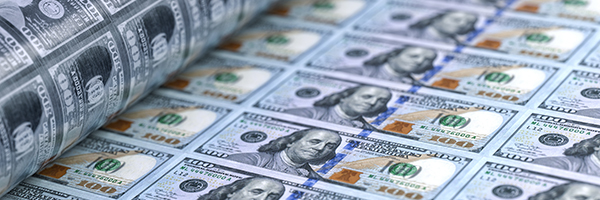Mid Term

September 20, 2021 | Daily JAM, Mid Term |
Just about all of the Pandemic stimulus programs–checks for households, no-cost small business loans, enhanced unemployment payments–will have expired by sometime in 2022. Which is leading economists to project a slowdown in the U.S. economy for the second half of 2022. No matter what the size of the Biden administration budget finally turns out to be. U.S. fiscal policy will go from stimulating economic activity to acting as a drag on the economy. The Brookings Institution’s Hutchins Center calculates that the economic impact from federal, state and local-government taxes and spending turned negative in the second quarter of 2021 and will remain that way into 2023.
August 16, 2021 | Daily JAM, Mid Term |
The Chinese government reported today that the country’s economy slowed more than expected in July. Retail sales were crimped by tough new virus restrictions introduced toward the end of the month to contain fresh outbreaks. Retail sales rose by 8.5% near over year. Analysts had expected growth of 10.9%.

August 10, 2021 | ALB, AMSC, CAT, Daily JAM, DE, Mid Term, MLM, Morning Briefing, VMC |
The $1.2 trillion infrastructure bill that the Senate passed today–roughly half of that represents new spending–still faces a tough go in the House of Representatives where progressive Democrats have criticized the measure as light on dollars to fight global climate change. That spending has been pushed into a second infrastructure bill, which would also include money for expanding Medicare and improving access to childcare among other “social” infrastructure spending, which the Senate actually took up today. Most political pundits think that efforts to pass a “social” infrastructure bill using reconciliation will be enough to secure all the votes needed to pass the traditional infrastructure bill in the House. The bill passed today would include more than $110 billion to replace and repair roads, bridges and highways, and $66 billion to boost passenger and freight rail. The plan includes an additional $55 billion to address problems in the U.S. water supply such as continued use of lead pipes despite conclusive evidence that lead in water pipes leads to cognitive impairment in children. It allocates $65 billion to modernize the country’s power grid and $7.5 billion to build out a national network of electric-vehicle charging stations. The bill earmarks $47 billion to respond to wildfires, droughts, coastal erosion, heat waves and other climate crises.

August 4, 2021 | Daily JAM, Mid Term, Morning Briefing |
I wouldn’t call it the consensus yet, but financial market thinking seems headed toward a belief that the end of the Fed’s $120 billion a month in purchases of Treasuries and mortgage backed assets won’t be a big deal. Certainly not enough to upset the bond market or produce another temper tantrum. The belief hinges on forecast of demand and supply that sees them roughly in balance even after the Fed stops its buying. An end to Fed purchases would be a significant hit to demand. But it looks like the U.S. Treasury will be cutting back on bond auctions as about the same time. And that would leave demand and supply roughly where they are now.

August 3, 2021 | Daily JAM, Mid Term |
With China closing tourist sites, cancelling flights and beginning the hard work of testing all 12 million residents of Wuhan (again), economic activity in China is taking a hit. (And don’t forget horrific flooding in parts of the country.) Securities firm Nomura lowered projections for third-quarter GDP growth to 5.1% (from a previous 6.4%) and for the fourth quarter to 4.4% growth down from 5.3%

July 29, 2021 | Daily JAM, Mid Term |
U.S. gross domestic product grew 1.6% in the second quarter of the year, the Commerce Department said today, July 29. That’s up from 1.5% growth in the first quarter of 2021. On an annualized basis, second-quarter growth was 6.5 percent. Which brings the economy back to where it was before the pandemic (adjusted for inflation.) That’s a remarkable quick rebound. After the Great Recession ended in 2009, it took two years for the economy to recover the ground that it has lost. But the recovery now faces two tougher jobs: replacing all the growth that didn’t happen because of the pandemic and fixing problems like anemic productivity growth and soaring economic inequality that troubled the U.S. economy before the pandemic recession. .

July 28, 2021 | Daily JAM, Mid Term |
Senate Democrats and Republicans on Wednesday appeared to clinch a deal that would invest roughly $1 trillion into the nation’s infrastructure. The new agreement — announced separately by two of its lead negotiators, Senators Rob Portman (R-Ohio) and Kyrsten Sinema (D-Ariz.), ends the wrangling over the policy specifics in a bipartisan infrastructure deal outlined back in June. The agreement puts the Senate on track to hold a key procedural vote today, July 28, that would allow the chamber to actually begin debating the contents of the infrastructure measure

July 12, 2021 | Daily JAM, Mid Term |
The Johnson & Johnson (JNJ) coronavirus vaccine has been linked to a rare side effect, the immune system disorder Guillain-Barré syndrome. Of 12.8 million J&J doses administered in the United States, there have been about 100 cases of Guillain-Barré syndrome, according to preliminary reports from the Centers for Disease Control and Prevention. The Food and Drug Administration plans to add a warning about Guillain-Barré to the J&J vaccine, The Washington Post has reported.

May 31, 2021 | Daily JAM, Mid Term, Morning Briefing, Special Reports |
Today’s installment includes one hedge (on the ViX) and one stock pick (Lam Research.) Now if you’ve been following along with the logic that I’ve laid out in this Special Report, you know that stocks face months of potential volatility around the Fed’s June 16 meeting (What will the Fed say about ending its $120 billion in monthly bond purchases?), the August global central bankers confab in Jackson Hole (Will the Fed use the occasion, as it has done in the past, to indicate a coming change in interest rate policy?), the Fed’s September 22 meeting (Will the Fed be content to say nothing with the next “important” meeting not until December?) and then the central bank’s December 15 meeting.) That’s a large number of occasions that could set the stock market to worrying again. And then, of course, there’s OPEC and the price of oil, the battle over the recently announced Biden budget, the continued logjam on infrastructure spending, and fact that the pandemic is still running at full speed in countries such as India (and who knows what the return of cold weather and forced winter “togetherness” will do to infection rates in the developed economies of the northern hemisphere.) At 16.74 on the VIX, you don’t need a panic to produce a profit on higher volatility. The VIX was at 22.18 on May 19. And then there are the even higher VIX levels of 27.59 on May 12, 28.57 on Marcy 4, and 28.89 on February 25.

May 27, 2021 | Daily JAM, Mid Term, TSM |
Chip lead times, the gap between ordering a chip and taking delivery, increased to 17 weeks in April, indicating users are getting more desperate to secure supply, according to research by Susquehanna Financial Group. That is the longest wait since the firm began tracking the data in 2017.

May 26, 2021 | Daily JAM, Mid Term |
Yesterday, May 26, a Dutch court ordered Royal Dutch Shell (RDS) to cut its carbon emissions by 45% by 2030 compared with 2019 levels in a case brought by climate activist groups. The Hague District Court ruled that the Anglo-Dutch energy company has a duty to care about reducing greenhouse gas emissions and that its current reduction plans were not concrete enough. If that language sounds like the court is declaring a company has a fiduciary duty (to future generations? to current populations? to the earth?) to reduce emissions, you’re not mistaken.

May 25, 2021 | AMAT, Daily JAM, MGM, Mid Term, Morning Briefing, NXPI, Special Reports |
2021 will be a very different year from 2020. Or to be more exact the second half of 2021 and 2022 will be very different. We’re looking at going from a financial market where investors and traders believed the Federal Reserve was on their side with cash and more cash to push the prices of financial assets higher and then higher some more to a market where everyone is asking when will the Fed take th punch bowl away and shut down the party.Let me be clear. At this point it’s not the certainty that the Fed will reduce its $120 billion in monthly bond buying in this exact month or that, or the certainty that the Fed will start raising interest rates before the end of 2022, say, but rather the worry that those events are on the calendar, that they will change the trend in the market, and that no one can predict when the turn will materialize.FDR said “We have nothing to fear but fear itself.” To which the market right now says “Exactly.” Look at this “fear and worry calendar” that I’ve put together. And today I’ve got 3 picks and one hedge for this market













